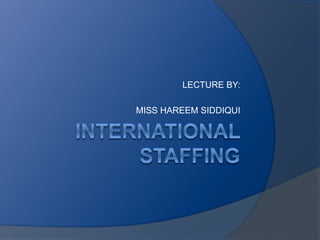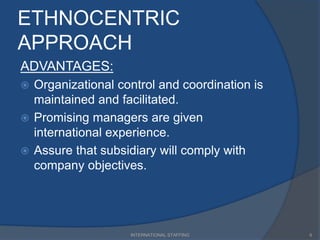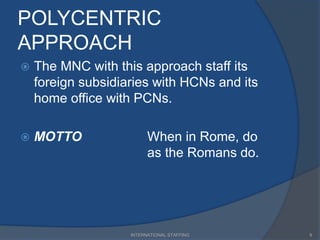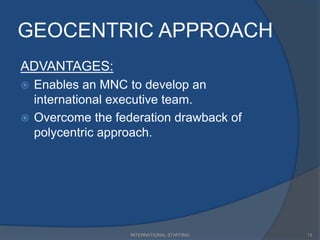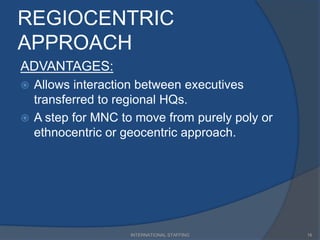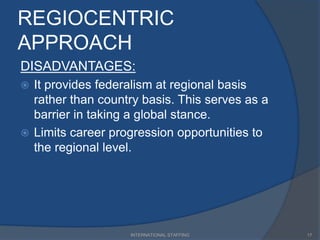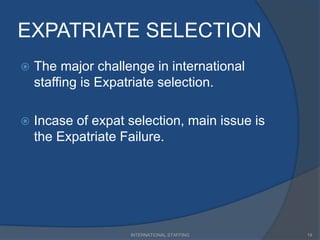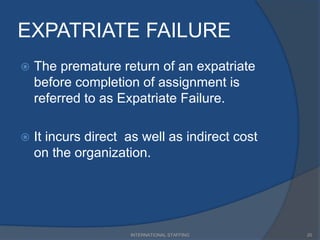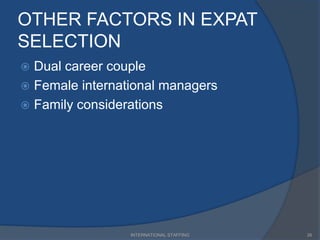International Staffing
- 1. LECTURE BY: MISS HAREEM SIDDIQUI
- 2. INTERNATIONAL STAFFING The decision of international staffing in MNC depends on following factors: General staffing policy on key positions in HQ and subsidiary. The ability of organization to attract the right candidate. The constraints placed by the host government on hiring policies. 2INTERNATIONAL STAFFING
- 3. APPROACHES TO INTERNATIONAL STAFFING 4 approaches: Ethnocentric approach Polycentric approach Regiocentric approach Geocentric approach 3INTERNATIONAL STAFFING
- 4. ETHNOCENTRIC APPROACH Results in the staffing of key positions in the MNC by PCNs. MOTTO this works in my country, so it must work in all other countries. 4INTERNATIONAL STAFFING
- 5. ETHNOCENTRIC APPROACH REASONS: Lack of qualified HCNs particularly senior management talent. A desire to maintain good communication, coordination, tighter control and a unified corporate culture linked with corporate HQ. A desire to transfer parent firm’s core competencies to a foreign subsidiary more expeditiously. 5INTERNATIONAL STAFFING
- 6. ETHNOCENTRIC APPROACH ADVANTAGES: Organizational control and coordination is maintained and facilitated. Promising managers are given international experience. Assure that subsidiary will comply with company objectives. 6INTERNATIONAL STAFFING
- 7. ETHNOCENTRIC APPROACH DISADVANTAGES: Limits the promotion opportunities of HCNs which may lead to reduced productivity and increased turnover among that group. The adaptation of expatriate managers to new environment takes time during which these expatriates make poor decisions. Income packages of expatriates are 4 times higher than locals. 7INTERNATIONAL STAFFING
- 8. POLYCENTRIC APPROACH The MNC with this approach staff its foreign subsidiaries with HCNs and its home office with PCNs. MOTTO When in Rome, do as the Romans do. 8INTERNATIONAL STAFFING
- 9. POLYCENTRIC APPROACH ADVANTAGES: Eliminates language barriers. Avoids adjustment problems of expatriates and their families and removes the need for cultural awareness training. Less expensive. Gives continuity to the management of foreign subsidiaries, thus reduces turnover. 9INTERNATIONAL STAFFING
- 10. POLYCENTRIC APPROACH DISADVANTAGES: The gap between HQ and subsidiaries increased which becomes difficult to be managed. Limited career opportunities for HCN and PCN managers. 10INTERNATIONAL STAFFING
- 11. GEOCENTRIC APPROACH This approach utilizes the best people for key jobs through out the organization, regardless of nationality. 11INTERNATIONAL STAFFING
- 12. GEOCENTRIC APPROACH REASONS: Highly competent employees are available not only at HQs but also in subsidiaries. International experience is a condition for success in top positions. Managers with high potential are constantly ready to be transferred from one country to another. 12INTERNATIONAL STAFFING
- 13. GEOCENTRIC APPROACH ADVANTAGES: Enables an MNC to develop an international executive team. Overcome the federation drawback of polycentric approach. 13INTERNATIONAL STAFFING
- 14. GEOCENTRIC APPROACH DISADVANTAGES: Host govt. pressurizes MNC to employ high number of HCNs. Expensive to implement because of training and relocation expense. Time consuming. Requires more centralized control of staffing. 14INTERNATIONAL STAFFING
- 15. REGIOCENTRIC APPROACH Refers to the functional rationalization on a more than one country basis. Regionally oriented approach where an MNC divide its operations into geographical regions and transfer staff within those regions. 15INTERNATIONAL STAFFING
- 16. REGIOCENTRIC APPROACH ADVANTAGES: Allows interaction between executives transferred to regional HQs. A step for MNC to move from purely poly or ethnocentric or geocentric approach. 16INTERNATIONAL STAFFING
- 17. REGIOCENTRIC APPROACH DISADVANTAGES: It provides federalism at regional basis rather than country basis. This serves as a barrier in taking a global stance. Limits career progression opportunities to the regional level. 17INTERNATIONAL STAFFING
- 18. ISSUES IN STAFF SELECTION Expatriate selection Selection criteria Use of selection tests Other factors in expat selection 18INTERNATIONAL STAFFING
- 19. EXPATRIATE SELECTION The major challenge in international staffing is Expatriate selection. Incase of expat selection, main issue is the Expatriate Failure. 19INTERNATIONAL STAFFING
- 20. EXPATRIATE FAILURE The premature return of an expatriate before completion of assignment is referred to as Expatriate Failure. It incurs direct as well as indirect cost on the organization. 20INTERNATIONAL STAFFING
- 21. EXPATRIATE FAILURE DIRECT COST: Airfares Associated relocation expenses Salary Training 21INTERNATIONAL STAFFING
- 22. EXPATRIATE FAILURE INDIRECT COST: Affecting organization Loss of market share Difficulties in dealing with the host govt. officials. Affecting Expats Loss of self esteem Loss of self confidence Loss of prestige among peers Reduced motivation Loss of promotional opportunities 22INTERNATIONAL STAFFING
- 23. EXPATRIATE FAILURE REASONS: Spouse/partner dissatisfaction Family concerns Ability to adapt Wrong Candidate selection Job fails to meet expectations Job performance Quality of life Remuneration dissatisfaction 23INTERNATIONAL STAFFING
- 24. SELECTION CRITERIA Technical ability Cross cultural suitability Family requirements Country cultural requirements Language 24INTERNATIONAL STAFFING
- 25. USE OF SELECTION TESTS Personality tests Psychological tests 25INTERNATIONAL STAFFING
- 26. OTHER FACTORS IN EXPAT SELECTION Dual career couple Female international managers Family considerations 26INTERNATIONAL STAFFING
